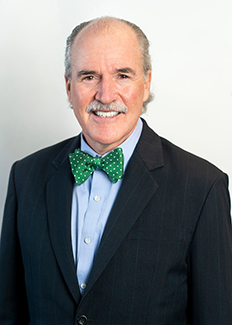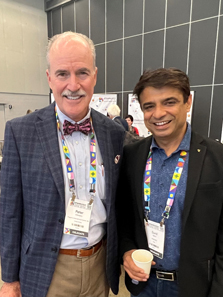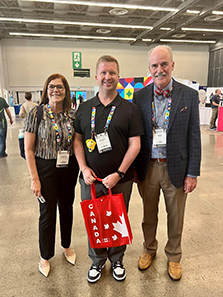Building capacity for research on sexually transmitted infections in low- and middle-income countries
July/August 2025 | Volume 24 Number 4
I started my federal government career three decades ago in the CDC Division of Sexually Transmitted Disease Prevention, so I was excited to travel to Montreal in July for the
World Congress of the International Society for Sexually Transmitted Diseases Research and the International Union against Sexually Transmitted Infections.
 Read recent commentary on global health research issues from current and immediate past directors of the Fogarty International Center.
Read recent commentary on global health research issues from current and immediate past directors of the Fogarty International Center.
For the convention, I’d organized a symposium that emphasized how the burden of sexually transmitted infections (STIs) in low- and middle-income countries (LMICs) is eight-fold higher than in high-income countries. This means the need for STI research in LMICs is substantially higher, yet opportunities are increased as well. Research priorities include developing affordable point-of-care diagnostics as well as novel antibiotics, antivirals, and vaccines; investigating antibiotic resistance; optimizing behavioral interventions; integrating STI services with other health programs; using digital health solutions; and conducting research of at-risk groups such as teens, sex workers, men who have sex with men, and people living with HIV.
The symposium presentations began with
Dr. Le Minh Giang from Hanoi Medical University in Vietnam. He described how their Fogarty D43 research training grant is building on the national HIV prevention program (supported by PEPFAR) and includes important roles for both Vietnamese and U.S. mentors to support early-career colleagues. His mentee, Dr. Bùi Thị Minh Hảo, described her own progression including the publication of multiple studies on STI testing and use of doxycycline for STI prophylaxis within Vietnam’s HIV prevention program clinical infrastructure.
Next,
Dr. Jenell Stewart from Hennepin Healthcare in Minnesota spoke on behalf of herself and
Dr. Elizabeth Bukusi, a former Fogarty trainee and current Fogarty grantee. They have been building research capacity in Kisumu, Kenya, integrating HIV and STI research and training into public health programs supported by PEPFAR and other funders. As depicted by Stewart, the Kenya Medical Research Institute’s ”family tree” is topped by the late
Dr. King Holmes with multiple generations of mentees, both U.S. and Kenya researchers, on lower branches. Holmes was a professor at University of Washington as well as Fogarty grantee and board member and an early leader in AIDS care and research. He is often referred to as the “father of sexually transmitted diseases research.”
 Photo courtesy of Peter KilmarxPeter Kilmarx and Sunil Sethi
Photo courtesy of Peter KilmarxPeter Kilmarx and Sunil Sethi
Next up was Latin America.
Dr. Patty Garcia, a Fogarty trainee and grantee from Universidad Peruana Cayetano Heredia, Peru, spoke about her own early research as a mentee of Holmes. Their work characterizing the burden of STIs in Peru led to the development of a robust HIV and STI clinical care and research infrastructure in Peru. Eventually, she also served as her country’s Minister of Health. The final presenter, Dr. Álisson Bigolin, also described how he entered the field of STIs. With the support of his mentors, he now leads STI diagnostics development in the Brazilian Ministry of Health.
Co-moderator
Dr. Francis Ndowa, director of the Skin & Genito-Urinary Medicine Clinic in Zimbabwe, underscored the need for bridging the know-do gap—translating evidence-based research findings into practice—while co-moderator
Dr. Kees Reitmeijer, an editor of the journal
Sexually Transmitted Diseases, highlighted the role of journals in supporting early-career researchers worldwide.
All who spoke emphasized the importance of local leadership, equitable research partnerships, sustainability, and translating research into practice. Perhaps surprisingly, these various presenters from Asia, Africa, and Latin America shared commonalities. Notably, they all started by developing public health and clinical infrastructure and later added a research component, which could then support research training. All believe the commitment of both U.S. and LMIC mentors as well as the dedication of their mentees has been instrumental for growth.
 Photo courtesy of Peter KilmarxLeft to right: Angelica Espinosa Miranda, Álisson Bigolin, Peter Kilmarx
Photo courtesy of Peter KilmarxLeft to right: Angelica Espinosa Miranda, Álisson Bigolin, Peter Kilmarx
By providing funding and protected time for both mentors and trainees, Fogarty has played and continues to play a crucial role in the development of research capabilities worldwide. Its work strengthening partnerships between U.S. and LMIC institutions and establishing a platform for networking and sharing best practices has also helped. Undoubtedly, STI research conducted by former Fogarty trainees in all corners of the globe has improved health not only worldwide, but also in the United States, where it has informed STI prevention and treatment guidelines and practices, and contributed to the development of STI diagnostics and vaccines that benefit all humanity.
After the symposium, Bigolin introduced me to his mentor,
Dr. Angelica Espinosa Miranda, STI Unit Coordinator in the Brazilian Ministry of Health. While chatting, she mentioned that she is also a former Fogarty trainee. Another encounter was with
Dr. Sunil Sethi, a professor at the Post Graduate Institute of Medical Education and Research in Chandigarh, India. He’ll be hosting the 2027 World STI & HIV Congress and we discussed including a day-long session on research capacity building. He is also a former Fogarty trainee!
Later in Montreal, I also met with
Dr. Madhukar Pai, Chair of the Department of Global & Public Health at McGill University. He is originally from India and has been a leading advocate for fairness in international research collaborations. He and his staff were excited about expanding their undergraduate global health program. Pai, too, is a former Fogarty trainee with
Dr. Art Reingold at UC Berkeley!
Such chance conversations underscore the ways in which Fogarty, by pursuing its vision of capacity building, has extended the frontiers of health research and disseminated scientific advances across the globe. I expect many former Fogarty trainees will once again be attending the 2027 World STI & HIV Congress in India.
More information
Updated August 20, 2025
To view Adobe PDF files,
download current, free accessible plug-ins from Adobe's website.